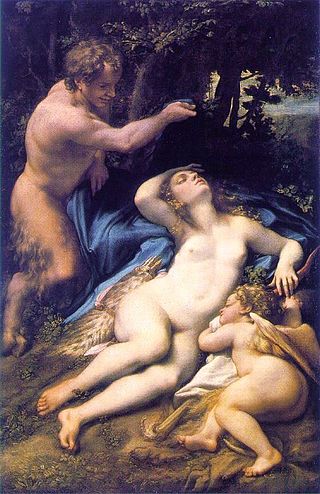Related Research Articles
Chalciope, in Greek mythology, is a name that may refer to several characters.
Aegle is the name of several different figures in Greek mythology:

In Greek mythology, Harmonia is the goddess of harmony and concord. Her Roman counterpart is Concordia. Her Greek opposite is Eris, whose Roman counterpart is Discordia.
In Greek mythology, Clymenus may refer to multiple individuals:
In Greek mythology, Laothoe can refer to the following women:
In Greek mythology, Pisidice or Peisidice was one of the following individuals:
In Greek mythology, Idyia or Eidyia was a daughter of the Titans Oceanus and Tethys, and queen to Aeëtes, king of Colchis. She was the mother of Medea, Chalciope and Absyrtus. According to Apollonius of Rhodes, she was the youngest of the Oceanides. Her name means "the fair-faced" or "the knowing one" derived from the Greek word εἴδω meaning "to see" or "to know".
In Greek mythology, Calyce or Calycia is the name of several characters.

In Greek mythology, Glaucus was a Greek prophetic sea-god, born mortal and turned immortal upon eating a magical herb. It was believed that he came to the rescue of sailors and fishermen in storms, having earlier earned a living from the sea himself.
In Greek mythology, Myrmidon was the eponymous ancestor of the Myrmidons in one version of the myth.

In Greek mythology, Erysichthon, also anglicised as Erisichthon, was a king of Thessaly. He was sometimes called Aethon.

In Greek mythology, Antiope or Antiopa may refer to the following
In Greek mythology, Phorbas or Phorbaceus was a Thessalian prince and hero of the island of Rhodes. He was sometimes confounded with the Phlegyan Phorbas.

In Greek mythology, Asteria or Asterie is a daughter of the Titans Coeus (Polus) and Phoebe and the sister of Leto. According to Hesiod, by the Titan Perses she had a single child, a daughter named Hecate, the goddess of witchcraft. Other authors made Asteria the mother of the fourth Heracles and Hecate by Zeus.
In Greek mythology, Erato was the name of the following individuals.
In Greek mythology, Arethusa may refer to the following personages:
In Greek mythology, Eupolemeia was a Phthian princess as daughter of King Myrmidon and possibly Peisidice, thus sister to Antiphus, Actor, Erysichthon, Dioplethes and Hiscilla. Eupolemeia consorted with Hermes and by him, she bore Aethalides near the streams of Amphrysus.
In Greek mythology, Dioplethes was a Phthian prince as son of King Myrmidon and possibly Peisidice, thus brother to Antiphus, Actor, Erysichthon, Eupolemeia and Hiscilla. In some accounts, he was the father of Perieres, King of Messenia.
In Greek mythology, Rhoeo may refer to two distinct characters:
In Greek mythology, Scarphe was possibly the mother, by Aeson, King of Iolcus, of Jason and possibly Promachus.
References
- Apollonius Rhodius, Argonautica translated by Robert Cooper Seaton (1853-1915), R. C. Loeb Classical Library Volume 001. London, William Heinemann Ltd, 1912. Online version at the Topos Text Project.
- Apollonius Rhodius, Argonautica. George W. Mooney. London. Longmans, Green. 1912. Greek text available at the Perseus Digital Library.
- Athenaeus of Naucratis, The Deipnosophists or Banquet of the Learned. London. Henry G. Bohn, York Street, Covent Garden. 1854. Online version at the Perseus Digital Library.
- Athenaeus of Naucratis, Deipnosophistae. Kaibel. In Aedibus B.G. Teubneri. Lipsiae. 1887. Greek text available at the Perseus Digital Library.
- Claudius Aelianus, Varia Historia translated by Thomas Stanley (d.1700) edition of 1665. Online version at the Topos Text Project.
- Claudius Aelianus, Claudii Aeliani de natura animalium libri xvii, varia historia, epistolae, fragmenta, Vol 2. Rudolf Hercher. In Aedibus B.G. Teubneri. Lipsiae. 1866. Greek text available at the Perseus Digital Library.
- Gaius Julius Hyginus, Astronomica from The Myths of Hyginus translated and edited by Mary Grant. University of Kansas Publications in Humanistic Studies. Online version at the Topos Text Project.
- Gaius Julius Hyginus, Fabulae from The Myths of Hyginus translated and edited by Mary Grant. University of Kansas Publications in Humanistic Studies. Online version at the Topos Text Project.
- Pseudo-Apollodorus, The Library with an English Translation by Sir James George Frazer, F.B.A., F.R.S. in 2 Volumes, Cambridge, MA, Harvard University Press; London, William Heinemann Ltd. 1921. ISBN 0-674-99135-4. Online version at the Perseus Digital Library. Greek text available from the same website.
- Publius Ovidius Naso, Metamorphoses translated by Brookes More (1859-1942). Boston, Cornhill Publishing Co. 1922. Online version at the Perseus Digital Library.
- Publius Ovidius Naso, Metamorphoses. Hugo Magnus. Gotha (Germany). Friedr. Andr. Perthes. 1892. Latin text available at the Perseus Digital Library.
- The Homeric Hymns and Homerica with an English Translation by Hugh G. Evelyn-White. Homeric Hymns. Cambridge, MA., Harvard University Press; London, William Heinemann Ltd. 1914. Online version at the Perseus Digital Library. Greek text available from the same website.